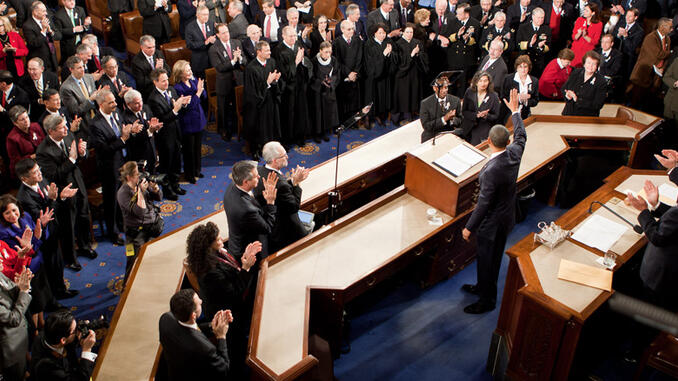
Next week there are two major events to discuss. One is President Trump will address Congress for the first time, and the other is a United Nations showdown between Russia and the West over Kosovo independence. The latter will be Trump’s first real international test in regards to his relationship with Putin and Russia.
Trump to Address Congress
President Trump will address Congress for the first time in his presidency on Tuesday the 28th after accepting Speaker Ryan’s official invitation. His first month in office in regards to foreign policy has been counterproductive to say the very least. With the travel ban legal issues, the firing of Michael Flynn, the reversal in positions about the One China policy, being both for and against a two-state solution for Israel, and of course questionable Russian ties with his team, Trump’s first 30 days are historically rocky. His address to Congress next week offers him the opportunity to hit the reset button and to make clear his agenda.
Any comments by the President on the repeal and replacement of the Affordable Care Act, the debt ceiling, tax reform, and infrastructure improvement will be closely listened to because of his campaign promises. Trump has previously said he will not cut funding to Medicare and Social Security programs, and he has campaigned on increasing military spending. Those two items alone account for 80 percent of the U.S. budget. Add his pledge to cut taxes, it seems highly unlikely the national debt burden will be lessened by any significant amount, unless Trump goes back on his campaign pledges or there is a historic increase in government revenue somehow. At midnight on March 16th, the government debt ceiling will automatically kick in, making the formation of a new budget absolutely necessary. With Republicans controlling the House, Senate, and the Executive, the onus is on them to show results.
Trump’s address will likely be very telling on what his real priorities are for the coming year. Lately he has been seemingly in campaign mode by holding rallies and pumping out rhetoric to keep his base of support energized. But as the adage goes, campaigns are about promises, governing is about choosing. Many Americans will likely be watching. If recent history is any indication, President Obama had 52 million viewers for his first address to Congress—more viewers than any of Obama’s subsequent State of the Union addresses.
As far as international policies, there is still much confusion on many of Trump’s positions. It has been common for President Trump’s team to state policy positions only for Trump himself to publicly state a different position. World leaders will no doubt be watching what Trump says to help further understand what Trump’s positions on international commitments exactly are.
The United Nations Debates Kosovo
Next week the United Nations Security Council will meet to discuss Kosovo independence. U.N. Ambassador to the U.N. Nikki Haley has already stated that Kosovo should have full U.N. membership—a policy Russia strongly opposes. “The US believes that the international community should acknowledge that Kosovo has made great strides since the declaration of independence. Kosovo deserves to take its rightful place in the international community, including the full membership in the UN,” Haley has said.
The Balkans have traditionally been a source of tensions with the West and Russia. The region was a major point of significance at the end of the Clinton administration with the U.S. and NATO forces heavy bombing campaign to remove Serbs from Kosovo in response to human rights abuses and atrocities. In 2008 Kosovo declared independence from Serbia. Since then more than 100 countries recognize independence, Russia not being one of them.
Ethnic and religious tensions in the region have been high since the collapse of the Soviet Union. It does not take much to inflame tensions there. Most recently, in January, a new train service with inflammatory advertisements on the side of their train cars, almost brought military conflict back to the region. The train service, which was the first direct connection between Belgrade and North Mitrovica in 20 years, had the words “Kosovo is Serbia” prominently displayed on their trains. The incident almost resulted in the mining of train tracks to prevent the train from entering Kosovo.
Despite the headache of ethnic and religious tensions, Russia sees the Balkans as being part of their sphere of influence. They do not want to see the West encroaching into that sphere. They are especially sensitive not only with Kosovo’s independence but also with Serbia trying to position itself to join the European Union. Serbia has also flirted with joining the NATO alliance, but so far has remained militarily neutral. Also in the region, last year Prime Minister of Montenegro Milo Đukanović accused Russia of trying to assassinate him for trying to also bring his country to join NATO. Obviously, Russia is putting a lot of effort in keeping the West out.
With the United States taking a position against what Russia sees as its str interests, next week’s security council meeting will be the first test between the Trump administration and Putin. It is also a situation where Russia can show its resolve to have better relations on issues between the European Union and the U.S. The world will be watching all sides closely.
